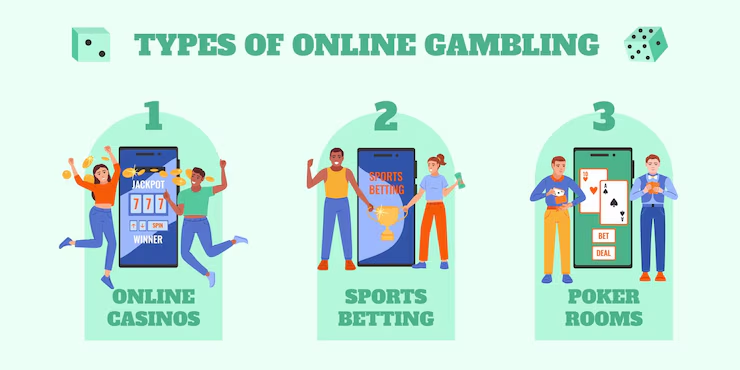Online gambling has become a massive global industry, transforming how people engage in gaming and betting activities. Thanks to advancements in internet technology, it has evolved from a niche hobby to a multibillion-dollar market. Today, online gambling offers a wide range of gaming experiences, from sports betting and casino games to poker, eSports, and fantasy sports.
The rise of online gambling has had a significant impact on society, creating new opportunities for entertainment while also raising concerns about responsible gaming and potential addiction. As more people participate in online gambling, the need for effective regulations and safeguards has grown.
The future of online gambling looks promising, with trends such as mobile gaming, live dealer games, and virtual reality experiences gaining traction. However, the industry faces ongoing regulatory challenges as governments work to balance innovation with the protection of players. As online gambling continues to evolve, it is crucial to address these issues while embracing new technologies.

The Rise of Online Gambling
The history of online gambling dates back to the mid-1990s when the internet first began to take off. The first online gambling site, InterCasino, was launched in 1996, and the same year, the Antigua and Barbuda government passed the Free Trade & Processing Act, allowing companies to apply for online gambling licenses. This set the stage for the rapid expansion of online gambling, which has since become one of the largest sectors in the global entertainment and leisure industry.
The ease and accessibility of the internet played a significant role in the success of online gambling. Gamblers no longer needed to visit land-based casinos or betting shops; they could place their bets and play games from the comfort of their homes, 24/7. The convenience of online gambling, along with the variety of games and bonuses offered by casinos, quickly attracted millions of players worldwide.
Types of Online Gambling
Online gambling encompasses a wide range of activities. Some of the most popular types include:
Online Casino Games
Online casinos provide a wide variety of traditional gambling games, including popular options like blackjack, roulette, baccarat, and slot machines. Many of these platforms also feature live dealer games, which allow players to interact with real dealers through live video feeds, enhancing the immersive experience. The evolution of major software providers, such as Microgaming, Playtech, and NetEnt, has played a crucial role in improving the quality of online casino games. These providers have helped deliver high-definition graphics, smooth gameplay, and innovative features that closely mimic the atmosphere and experience of land-based casinos, allowing players to enjoy the thrill of gambling from the comfort of their own homes.
Sports Betting
Sports betting has seen a massive surge in popularity in recent years, allowing bettors to place wagers on a wide array of sporting events. From mainstream sports like football, basketball, and tennis to niche sports such as esports and horse racing, online sports betting platforms cater to a broad spectrum of interests. Bettors can wager on individual matches, tournaments, or even place live bets during a game as it unfolds. With the advancement of real-time data analytics, sports betting has become more engaging and dynamic. Mobile apps have made placing bets on the go easier than ever, further enhancing the accessibility of sports betting for users worldwide.
Poker
Online poker has witnessed a tremendous rise in popularity, with major platforms like PokerStars and 888Poker offering various poker variants, such as Texas Hold’em, Omaha, and Seven Card Stud. These platforms cater to players of all experience levels, allowing beginners to learn the game while offering seasoned pros the chance to compete in high-stakes games. Online poker offers a range of formats, including cash games, tournaments, and sit-and-go events, providing a diverse selection for different player preferences. The global reach of online poker means players can join games with a variety of stakes, from small buy-in tournaments to high-stakes tables, creating an inclusive environment for poker enthusiasts worldwide.
Fantasy Sports
Fantasy sports have quickly become a dominant subcategory within online gambling, particularly in regions like North America. Platforms like FanDuel and DraftKings have made it easy for users to create fantasy teams, compete against others, and earn rewards based on real-world performance metrics of athletes. Initially, fantasy sports started as a casual, free-to-play hobby, but over time it has evolved into a serious form of gambling. With large prize pools, high stakes, and growing popularity, fantasy sports betting has become a major industry. The ability to track player stats and make real-time decisions has captivated millions, offering a unique blend of skill and luck that keeps players engaged season after season.

Esports Betting
The rise of esports has opened up an entirely new niche within online gambling. Esports betting allows fans to wager on competitive video games such as League of Legends, Dota 2, and Counter-Strike: Global Offensive. As esports tournaments continue to attract large viewerships, the market for esports betting has grown rapidly, particularly among younger audiences. With the ability to place bets on matches, tournaments, and even specific in-game events, esports betting offers a thrilling experience for those who are passionate about competitive gaming. As esports continue to gain mainstream recognition, the betting market surrounding it is expected to keep expanding, offering new opportunities for players to engage with their favorite games in a more interactive and rewarding way.
Why Is Online Gambling So Popular ?
Several factors have contributed to the exponential growth of online gambling:
Convenience
One of the main advantages of online gambling is the convenience it offers. Players can access a wide variety of games and betting options at any time of the day or night, without being restricted by location or operating hours. With the availability of mobile apps and user-friendly websites, gamblers can easily play games or place bets from virtually anywhere, as long as they have an internet connection. This means players no longer have to travel to a physical casino or betting establishment, making online gambling an extremely convenient and flexible option for those looking to enjoy gaming at their own pace.
Variety
Online gambling platforms provide an extensive range of games and betting opportunities that far exceed what’s available at traditional land-based casinos. Whether it’s trying out a new online slot game, participating in a fast-paced poker tournament, or even placing bets on niche sports like esports or virtual racing, the variety offered by online gambling keeps players engaged and excited. These platforms constantly introduce new games and features to ensure that there is always something fresh for players to explore, making it easy for individuals to find new ways to enjoy gambling and betting in a fun and dynamic environment.
Bonuses and Promotions
To attract new players and retain existing ones, online gambling platforms offer a wide range of bonuses and promotions. These incentives can include welcome bonuses for new users, free spins on popular slot games, cashback deals, and loyalty programs that reward frequent players. These bonuses can significantly enhance the gaming experience by offering gamblers more opportunities to win without having to spend additional money. Promotions also make online gambling more appealing, providing extra value to players and encouraging them to explore more games and betting options that they might not have considered initially.

Privacy
One of the key draws of online gambling is the level of privacy and anonymity it provides. Unlike traditional land-based casinos, where players may feel observed or judged, online platforms offer a more private and discreet environment for gambling. Players can enjoy the games without worrying about social pressures or the potential for uncomfortable interactions. This privacy allows individuals to gamble in a way that feels more personal and relaxed, making online gambling an attractive option for those who prefer to keep their gaming activities private.
Payment Flexibility
Online gambling platforms offer a range of payment options to cater to different player preferences. Whether it’s through credit cards, e-wallets, or even cryptocurrencies, players have the flexibility to deposit funds and withdraw winnings securely and efficiently. This wide array of payment methods ensures that transactions are fast and convenient, making it easier for players to fund their accounts or collect their winnings. Additionally, the availability of various payment options allows players to choose the method that best suits their needs, further enhancing the overall experience of online gambling.
Regulatory and Legal Issues in Online Gambling
While online gambling is booming, it remains highly controversial in some regions, and its legality varies greatly across the globe. Some countries have legalized online gambling and regulate it, while others have outlawed it entirely.
Licensing and Regulation

One of the critical factors in ensuring a safe and secure gambling experience for players is the licensing and regulation of online gambling operators. Trusted jurisdictions like the United Kingdom, Malta, and Gibraltar have stringent licensing requirements, including fair game play, responsible gambling practices, and the prevention of fraud. Operators licensed in these regions are held to high standards of transparency and player protection.
However, the lack of uniformity in gambling regulations creates confusion and potential risks for gamblers. Players from unregulated regions may find themselves at risk of fraud or unfair practices when using unlicensed platforms. As a result, international cooperation and regulation are critical to ensuring a fair, safe, and accountable gambling environment.
Gambling Addiction and Responsible Gambling
One of the most significant concerns surrounding online gambling is the potential for addiction. The ease of access, the wide variety of games, and the ability to gamble 24/7 can lead to compulsive gambling behaviors in some individuals. Online gambling platforms have increasingly recognized the need for responsible gambling measures. Many casinos offer self-exclusion tools, time limits, and the option to set deposit limits to help players manage their gambling habits.
Additionally, there are organizations such as GamCare and Gamblers Anonymous that provide support and resources for individuals struggling with gambling addiction. However, the anonymity of online gambling and the ability to play at any time can make it harder for people to realize or admit they have a problem.
The Role of Cryptocurrencies
Cryptocurrencies have gained significant popularity in the online gambling space, offering players a new form of payment that provides increased privacy, reduced transaction fees, and faster withdrawals. Bitcoin, Ethereum, and other altcoins are increasingly accepted by online gambling platforms. However, the volatility of cryptocurrencies and their association with illicit activities have raised concerns among regulators and law enforcement agencies.
Taxation and Revenue Generation
Governments worldwide are increasingly looking at online gambling as a source of revenue. Many countries have introduced taxes on online gambling operators and players, contributing to national budgets. However, issues surrounding tax rates, fair taxation policies, and the allocation of gambling revenue remain points of contention.
The Future of Online Gambling
As technology continues to advance, the future of online gambling looks even more exciting and dynamic. Several trends are emerging that may shape the industry’s trajectory in the coming years:
Virtual Reality (VR) and Augmented Reality (AR)
Virtual reality (VR) and augmented reality (AR) are set to transform the online gambling industry by providing players with highly immersive and interactive experiences. Through VR, players can step into a virtual casino environment, where they can interact with live dealers, other players, and 3D-rendered game tables. This technology allows gamblers to enjoy a realistic casino atmosphere, making online gambling feel much more like a traditional, land-based casino experience. The use of AR can further enhance this by overlaying digital elements into the player’s real-world environment, creating even more engaging experiences that bridge the gap between the online and physical casino worlds.

Artificial Intelligence (AI) and Personalization
Artificial intelligence (AI) is becoming an integral part of online gambling platforms, significantly improving the player experience. AI technology can analyze user behavior to create personalized recommendations, such as suggesting games or betting strategies based on individual preferences. It can also offer tailored rewards, enhancing player retention. On top of that, AI can be utilized to detect and prevent fraudulent activities like cheating, ensuring a fair and secure gaming environment. Additionally, AI plays a crucial role in promoting responsible gambling by identifying patterns of risky behavior and offering players support when needed, making online gambling safer and more enjoyable for everyone.
Mobile Gambling
The rise of smartphones and mobile technology has greatly contributed to the rapid growth of mobile gambling. With the convenience of mobile-optimized websites and apps, players can now access their favorite online gambling games anytime and anywhere. This flexibility allows gamblers to place bets, play slots, and enjoy casino games on the go. The continuous development of mobile platforms will likely further enhance the accessibility of online gambling, enabling more players to participate without being tied to a desktop computer. As mobile gambling continues to evolve, it will likely become even more user-friendly and feature-rich, making the gambling experience more engaging and convenient.
Blockchain Technology
Blockchain technology holds significant promise for revolutionizing the online gambling industry by introducing enhanced transparency, security, and trust. Through blockchain, online gambling platforms can offer secure, traceable, and tamper-proof transactions, ensuring that players’ funds and winnings are protected. Moreover, blockchain technology enables the concept of provably fair games, allowing players to verify the fairness of each round or hand. This transparency fosters greater trust between gambling platforms and their users, ensuring a more reliable gaming environment. As more online gambling platforms begin to adopt blockchain, players can expect a higher level of accountability and security in their gambling activities.
Expansion into New Markets
The growth of online gambling is further fueled by the increasing legalization of gambling in various countries around the world. As more governments legalize and regulate online gambling, the market is expanding rapidly, opening up new opportunities for online casinos and betting platforms. Emerging markets in regions such as Asia, Africa, and Latin America are especially promising, as internet penetration and smartphone usage continue to rise. These regions offer vast potential for online gambling growth, with an increasing number of consumers seeking accessible, online betting options. As these markets mature, online gambling platforms will continue to tap into new player bases, expanding their reach and offering more localized experiences.
Conclusion

Online gambling has evolved into a global industry that attracts millions of players every day, offering a wide array of gaming experiences from sports betting and poker to esports and fantasy sports. While the convenience, variety, and potential for huge rewards make online gambling enticing, it also raises significant concerns about regulation, addiction, and responsible gambling practices.
As the industry continues to grow, new technological advancements, such as VR, AI, and blockchain, will further shape the future of online gambling. With continued regulation and player protection, the online gambling industry has the potential to thrive in a responsible and sustainable manner, providing entertainment and excitement for millions of players worldwide.
FAQs
- Is online gambling legal ?
The legality of online gambling depends on the country or region. Some countries, like the UK and Spain, have legalized and regulated it, while others, such as the U.S. and China, may restrict or prohibit online gambling. It’s important to check local laws before engaging in online gambling. - How do online casinos ensure fair play ?
Online casinos use Random Number Generators (RNGs) to ensure the fairness of their games. Independent agencies like eCOGRA audit these games to verify that they are fair. Licensed casinos are also required to follow strict fairness and transparency regulations. - Can I make money from online gambling ?
While it’s possible to win, online gambling is primarily for entertainment, and the odds are often in favor of the house. Success depends on luck, skill, and strategy, but many players experience losses. It’s important to gamble responsibly. - What is responsible gambling, and how can I practice it ?
Responsible gambling means setting limits on time and money spent to ensure it remains fun. Many platforms offer tools like deposit limits and self-exclusion. Recognize signs of addiction, and seek support if necessary through organizations like GamCare. - What payment methods can I use for online gambling?
Common payment methods include credit cards (Visa, MasterCard), e-wallets (PayPal, Skrill), bank transfers, and cryptocurrencies (Bitcoin). Be sure to check for secure, convenient options and be aware of any fees or withdrawal times.




